Preparations for my #atlanticloop-adventure are well underway. I am right on track, except for the technical upgrades of GEKKO which is due to Covid 19 that hit me and many others of my colleagues and partners and the enervating delivery-crisis as many parts aren´t here in time. Nevertheless, I am resilient and adaptive, so I switch to more “softer” topics and resume planning of destinations, looking for partners there and try to suck up as much information as I can. In this you might have read my past article on the Caribbean, which I had called “Caribbean, or not?”. This one was a bit on the negative side citing many problems which may occur.
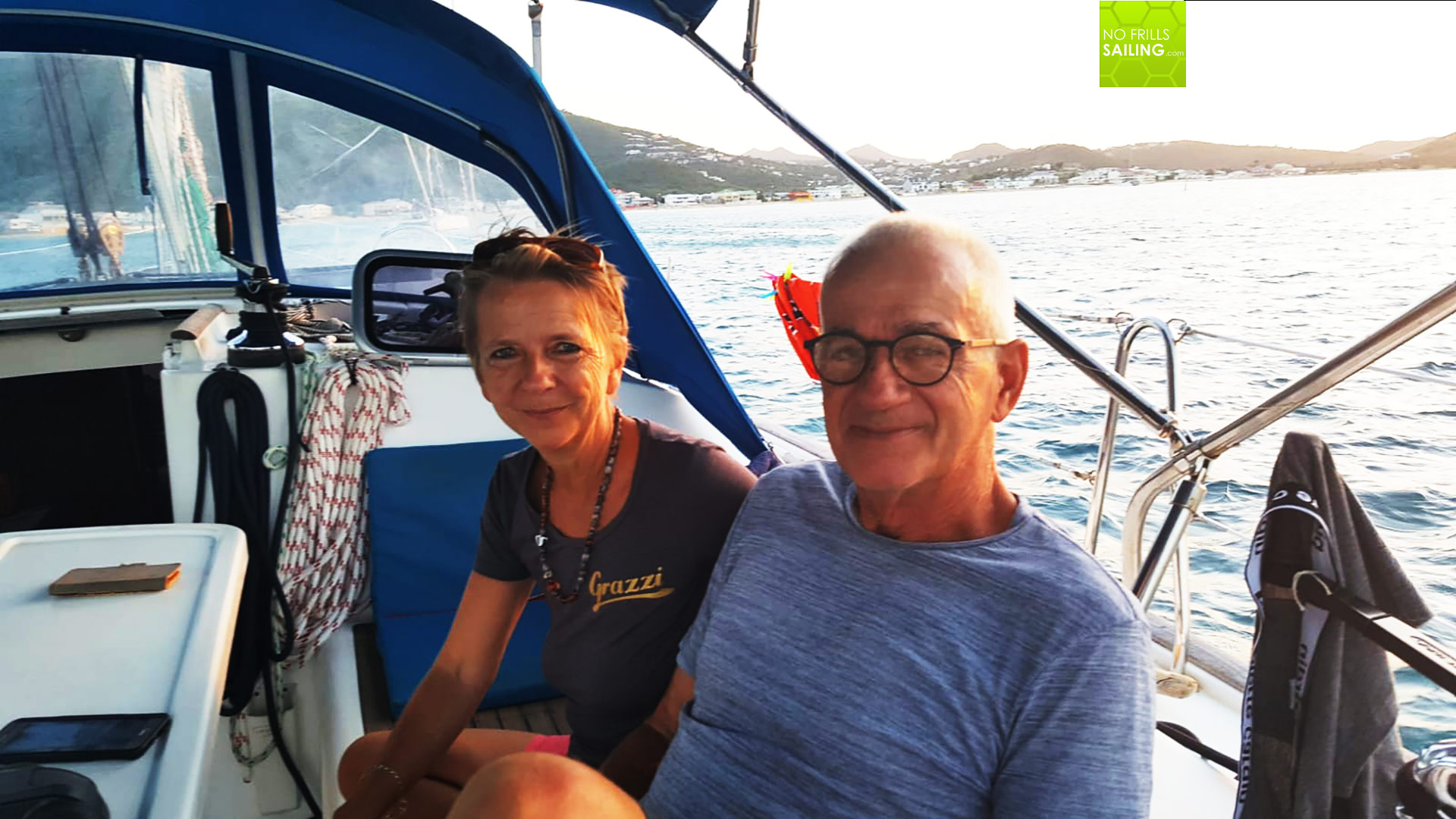
Well, there are always two sides to a medal and as such I am happy that a friend of mine acquainted me to Joachim Fritz. Joachim is a keen sailor since his childhood days and somebody one would reasonable to call an “old salt”. He literally lives on boats and, as my friend pointed out: “may be one of the most experienced Germans when it comes to the Caribbean.” As a good side of Covid 19-quarantine I was bound to my living room couch anyway and open for any suggestions by Joachim when to talk, which we did a couple of days ago. I asked him right away: “Caribbean, or not?” and he said: “Of course, get underway!” Here´s what we´ve talked about …
A vivid, colorful, diversified classic, still!
Lars Reisberg | NO FRILLS SAILING.com: “Joachim, thank for taking your time! Just tell me, since when are you living there in paradise and what is your connection with sailing in general?”
Joachim Fritz: “Well, Lars, I came here with my yacht DAPHNE, a wooden ketch, in 1991. During the time in Gomera, when I prepared 1990 DAPHNE for my Atlantic crossing together with my 11 year old daughter Anna Thetis, I met Petra, my wife, and she made that brave decision to join us for this new adventure. We arrived in January 1991 in Brasil and sailed via French Guyana, where Laura, my second daughter was born. We spent some time cruising between Trinidad and Venezuela. Finally, in 1994, we decided to settle down in Saint Martin as our economic situation made it necessary to find a job.”
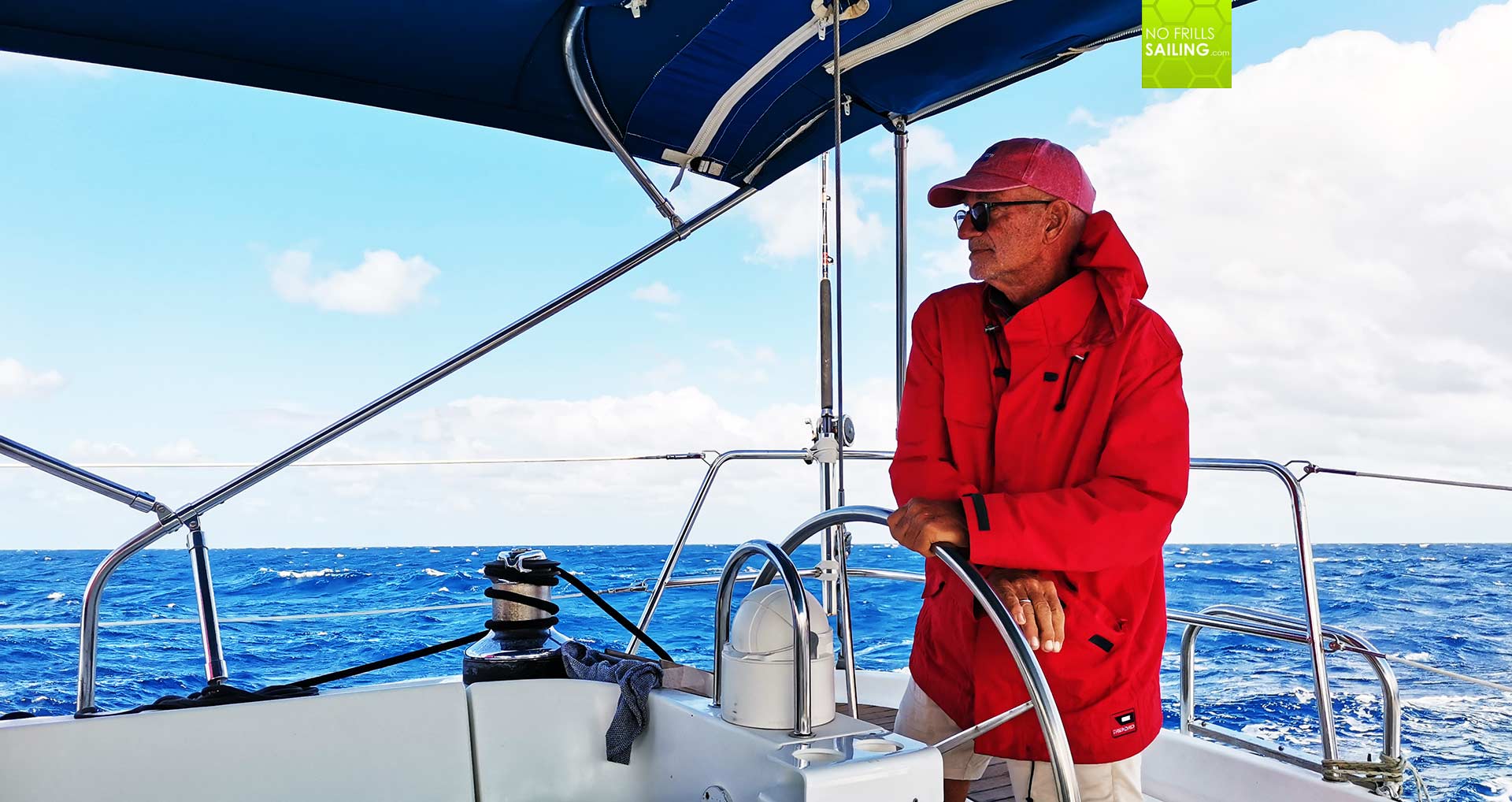
NO FRILLS SAILING.com: “On which boat did you came here?”
Joachim Fritz: “This ketch is a classic. She was built in 1936 in Turku at the ABO yard. The boat belonged to a Swedish writer and sailor, Göran Schildt. Interestingly enough you´ve made a review about one of his books and the boat he is on is DAPHNE, exactly the one I´ve bought from him thereafter …”
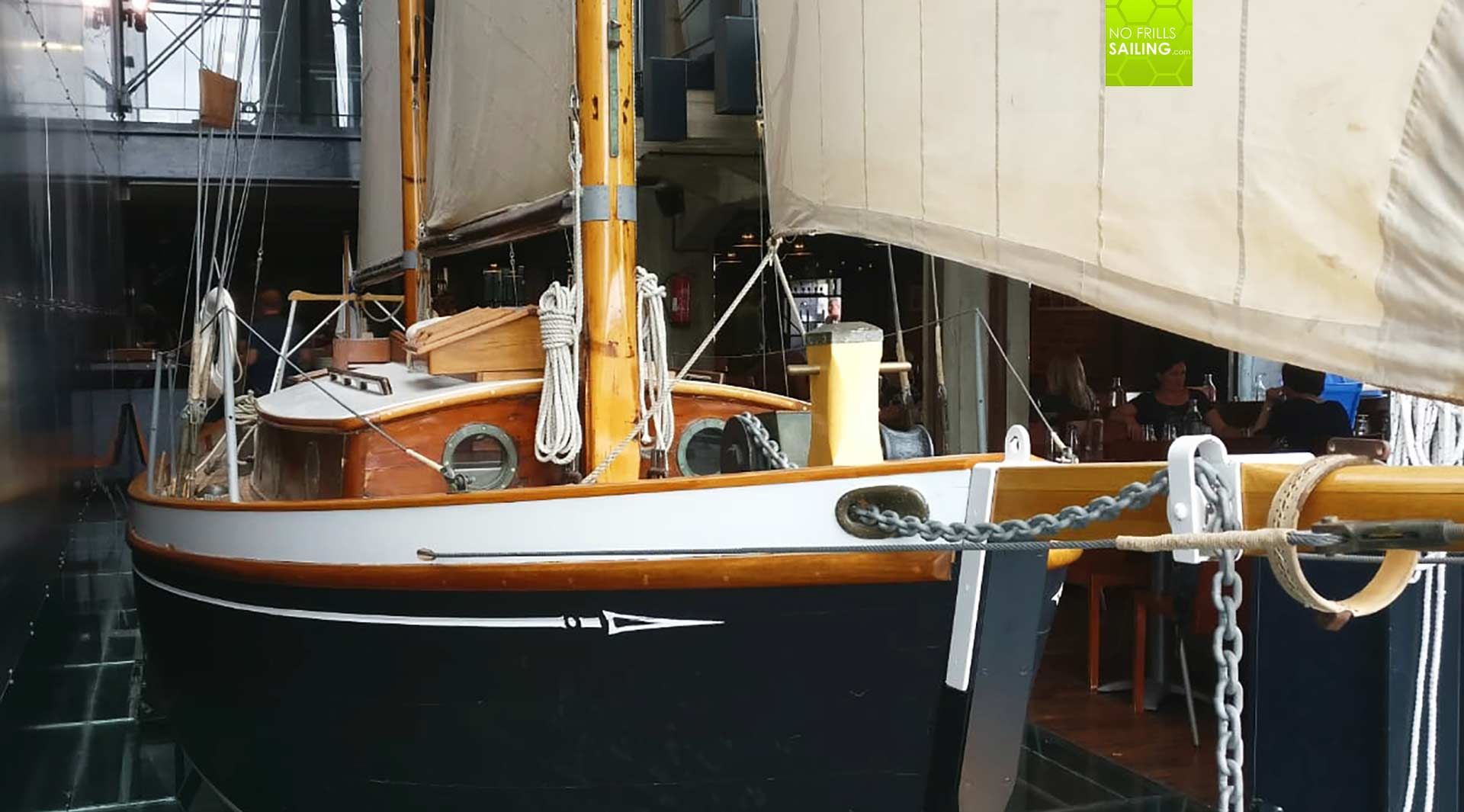
NO FRILLS SAILING.com: “What a great coincidence that is, isn´t it?!?”
Joachim Fritz: “Oh yes! But see, the sailing world is not such a big community, but yeah, it´s a nice and interesting turn of life. Anyway, we were very saddened by the fact that in 1995 Hurricane Luis destroyed DAPHNE to a state that refitting would have cost a fortune, so we declared it a total loss. Once again, fate surprise us as a Swedish museum bought her, refitted her to a state in which she would be presentable in the exhibition and now DAPHNE is part of it. Which warms my heart and makes me happy. But back to the Caribbean. My wife and I started to work in the tourism industry, for example as base manager for Sunsail and Moorings, hotel managers and so on. Now I am 73 years old, I turn 74 this year and I quit real work two years ago. On our Oceanis 473 we do vividly sail and are still fascinated by this wonderful Caribbean region, which we so much enjoy living in.”
The fascination of sailing the Caribbean
NO FRILLS SAILING.com: “You said it: Sailing the Caribbean: What make the fascination of this area for you, what is so very special and nice about it there from your point of view?”
Joachim Fritz: “For us personally the word “Caribbean” alone always had a special tone to it. Whe have always been drawn towards this region of the planet, I´d say. But to stay here wasn´t the plan originally. When we crossed the Atlantic Ocean in 1990/91 we of course had not a clear view on this although we´ve been kind of indoctrinated by the advertising industry that this should be a sailing paradise. All those islands, the different cultures rich in history and of course the opportunity to earn money for a living, which was the most important. After all, you need to have a steady income to pay for your lifestyle. Well, I´d say it is this way still today: There is a multitude of fascinating islands, bigger ones, smaller ones, inhabited and uninhabited … I would say it is the richness of all tastes and varieties that is so fascinating about the Caribbean. It´s a vast expanse and we still find something new after so many years.”
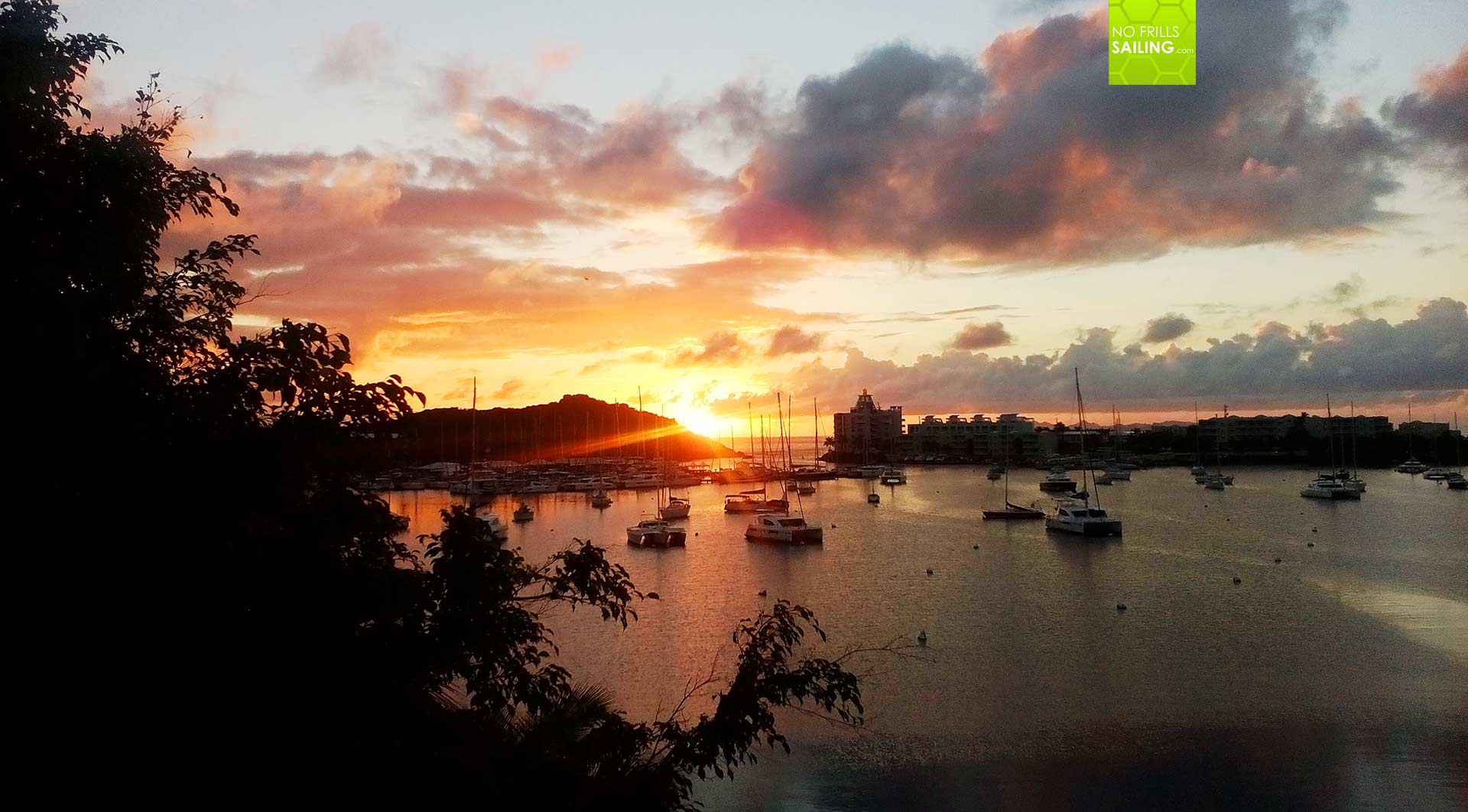
NO FRILLS SAILING.com: “In general, there are the Windward Islands and the Leeward Islands. For a newbie and total stranger: How can one tell them apart, or can´t one?”
Joachim Fritz: “Yes, you can, of course! Except for Haiti and Jamaica, which in 30 years I haven´t managed to visit yet, I know all of the major Islands in and around the Caribbean. As you know, we live on Saint Martin which is quite up North of the Leeward Islands. Before that we also lived for seven years on Saint Vincent, which in contrast is quite in the South. Now, what´s the difference? Well, it´s the weather, I´d say. Here on Saint Martin we do not have a real rainy season, it’s more like Mediterranean climate. Instead, we get strong north-easterly Trade Winds. Around now, December to February, we call them “Christmas Winds” as they are blowing at a steady 20 to 25 knots. It´s typical that we frequently get rain fronts where winds and gusts can quickly reach up to 40 knots – see, this is when most tourists come here to have their Christmas-vacation (laughs). Weather is best here starting from April to July when wind eases and it is dryer. In July we tend to receive the first real heavy weather systems and it gets interesting starting mid-August to September. All must be safe by then as Hurricane season starts really now. I would say it is becoming okay end of October or November again.”
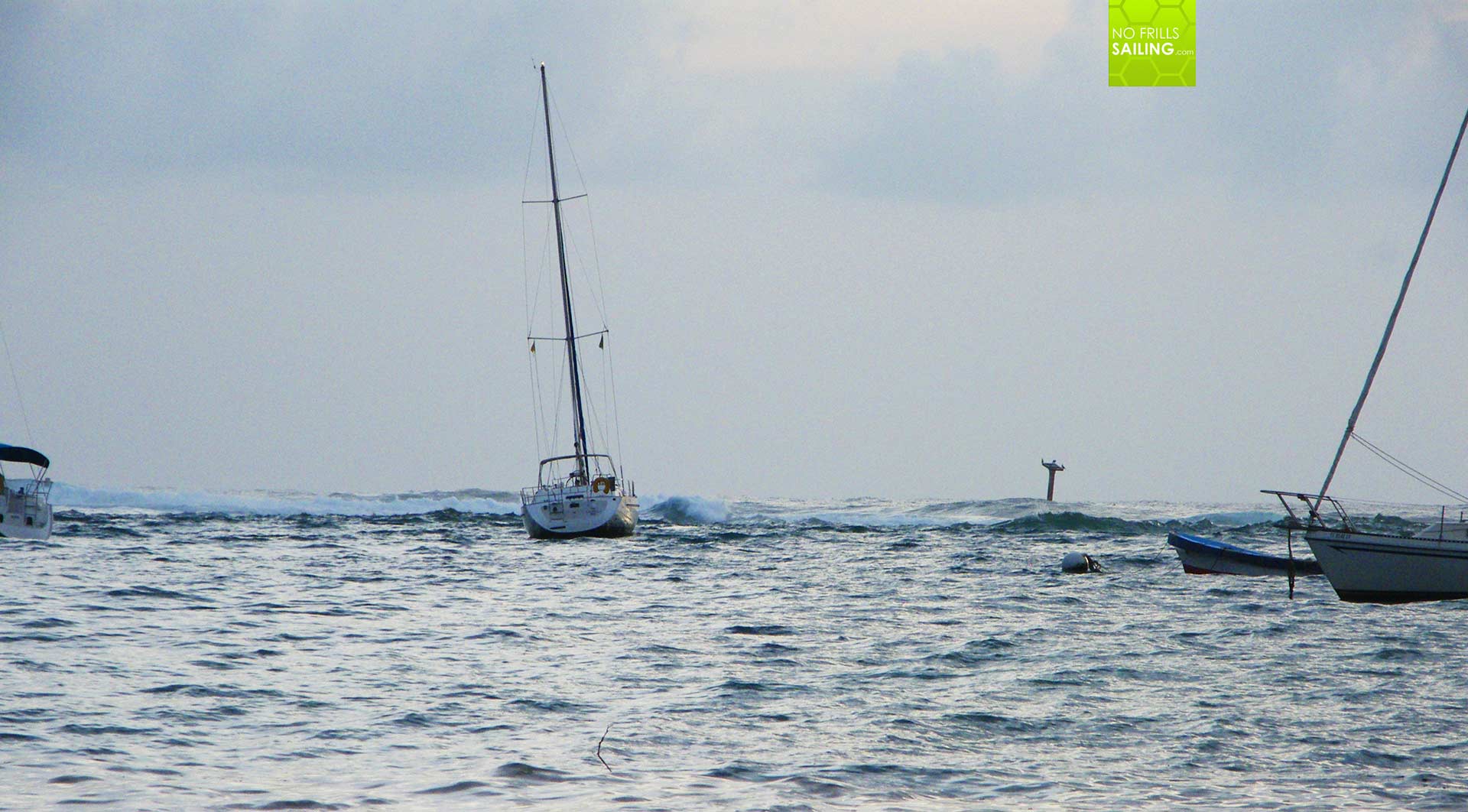
NO FRILLS SAILING.com: “That´s for the Leeward Islands?”
Joachim Fritz: “Yes. For the “border” as you may call it I´d say that´s Guadeloupe. Going down South more from here, weather starts to become more like in the Tropics. Very hot, rainy and 100% humidity. Also, always much wind here but you get proper sub-tropical weather here. One rain shower per day is normal in the dry season. These islands receive a real full-fledged rain season in contrary. That is the real thing, like in the tropics. Rain as black and dense as you can imagine! Mosquitos and all the stuff. On the other hand, that said, these islands are rich with dense rain forests, picturesque anchorages. Rough, untouched nature: Most of the islands are volcanic so you´ll see stunning panoramic views with bold cliffy mountains, dark black beaches. It´s fantastic. From a tourist point of view, there are less developed and much quieter. For example, Domenica and St. Vincent are wonderful dream islands for eco-tourism, no masses there like Barbados or St. Lucia.”
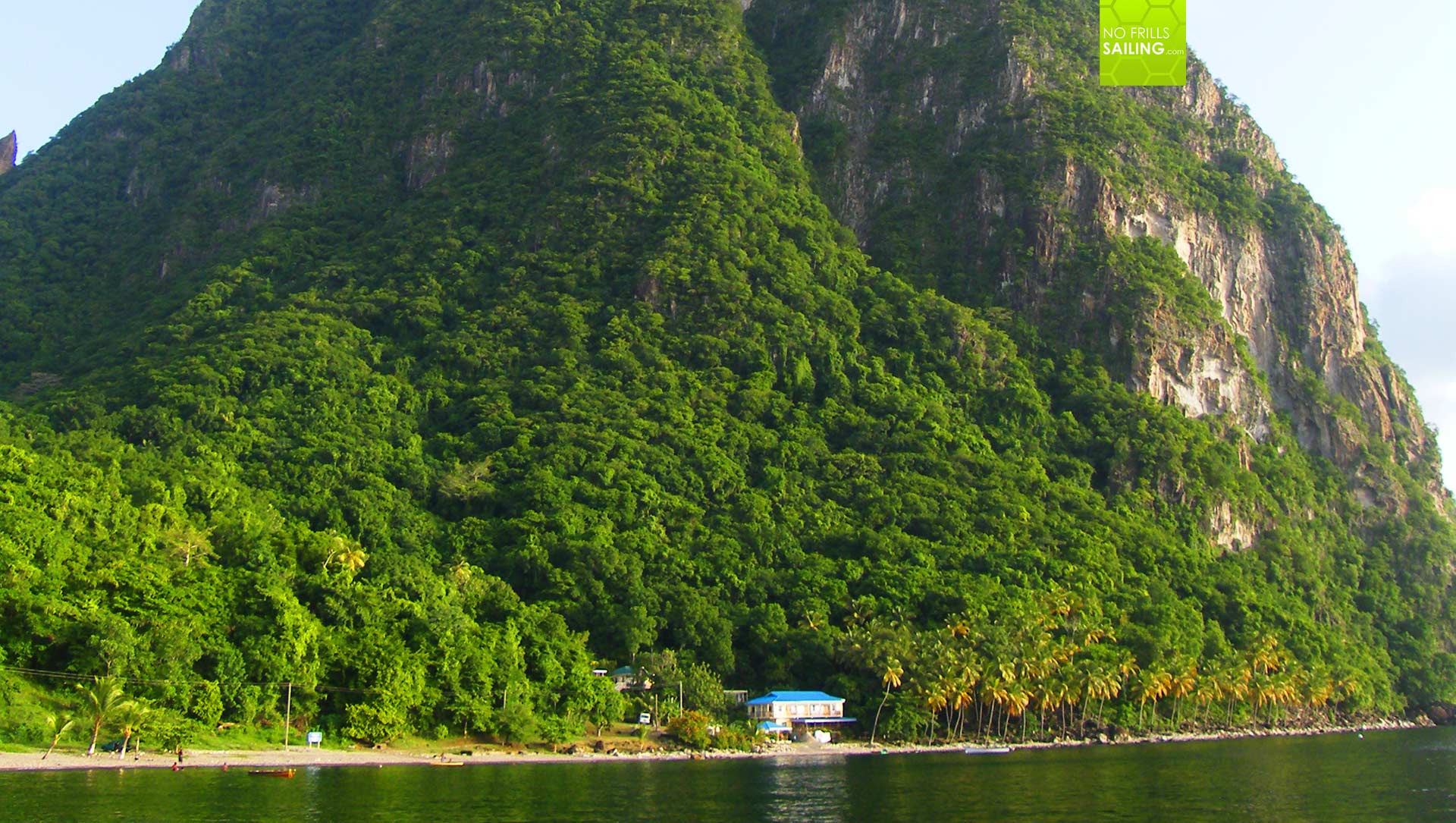
NO FRILLS SAILING.com: “I understand. So the distinction is driven by weather which in turn determines the general character of the island.”
Joachim Fritz: “That´s how I see it, yes. But I can assure you that, wherever you decide to go, all of them have their own charm and attractiveness. You get gigantic bays and intimate anchorages, interesting rocky formations as well as bristling island life, colorful food markets and vivid towns. One thing to mention and a factor too is the history of the islands. I mean, to which colonizing power these once belonged to. The islands once conquered by Spain are different from the English colonized islands. The whole feel, the culture, the food is different there, also the style of living. There are so many fantastic small islands, like the Grenadines, which all have their special own character. This comes with pros and cons, of course. For us very important was always to being able to move quickly. That is a big pro for Saint Martin/Sint Maarten: This island is half French, half Dutch and a major hop for travel with its international airport. You can get many direct flights to Europe and the US. One 0ther thing is the duty free-status here which makes life a lot easier! After more than 25 years in the Caribbean I can also say that – as a foreigner – it is much easier and comfortable to have some “rights” as French St. Martin is same as Martinque and Guadeloupe part of the EU.”
On mishaps and wrong assumptions amongst newbies
NO FRILLS SAILING.com: “I am a rookie when it comes to the Caribbean. That is why I now read all I can, watch videos on YouTube and try to talk to as many insiders – as you are – as I can to avoid making mistakes. What would you say are the biggest misconceptions about sailing in the Caribbean amongst newbies?”
Joachim Fritz: “Oh, there are some, I can tell you. (laughs) First of all, as always, have respect! Many, many people do not have a real idea of what it is like here in Caribbean. All they know are the perfect beauty-shots in brochures showing snowy white beaches, the occasional palm tree and Bikini-ladies with Aperol Spritz. Well, it can be that way, but not always and not assured! Such good conditions are honestly quite rare. For many people, especially sailors, it comes literally as a shock when they discover reality. See, winds are mostly around 15 to 20 knots here, they can quickly become stronger. Once you leave leeward side of the islands, you are prone to the full Atlantic swell – that´s easily a 2 to 3 meter wave! Locals don´t leave harbors usually when winds are over 25 knots because it´s too much heavy seas outside – and many tourists don´t know that. They simply ruin family vacations by acting stupid.”
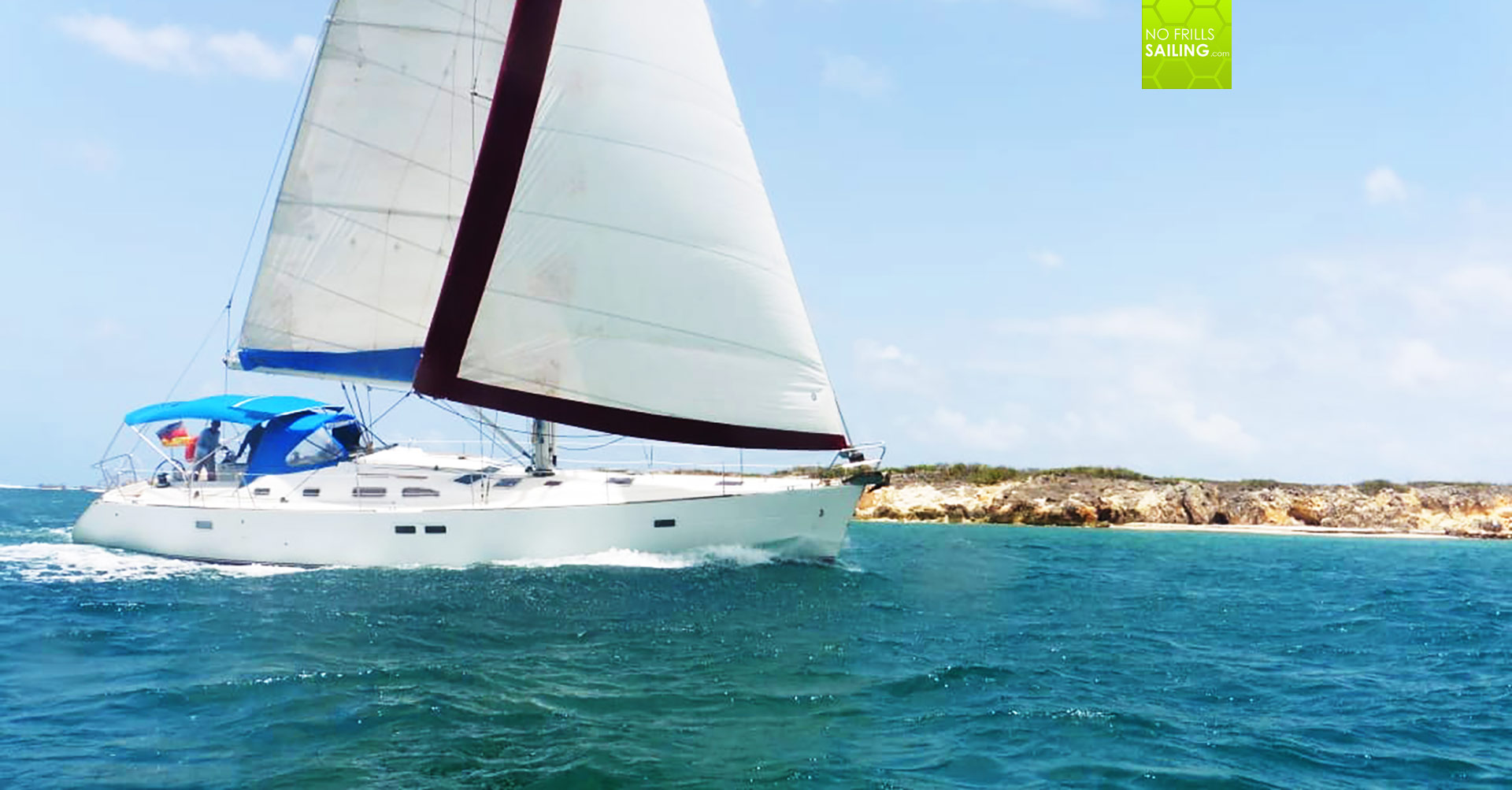
NO FRILLS SAILING.com: “So, sailing-wise it is a complicated area?”
Joachim Fritz: „I wouldn´t say complicated but call it demanding. You should be knowing what you do. All the cape effects at the island´s edges, the wind is brutal there, you get full broadside of more than 30 knots. Not knowing what you do can turn a nice summer sailing excursion into a stormy nightmare for family or guests.”
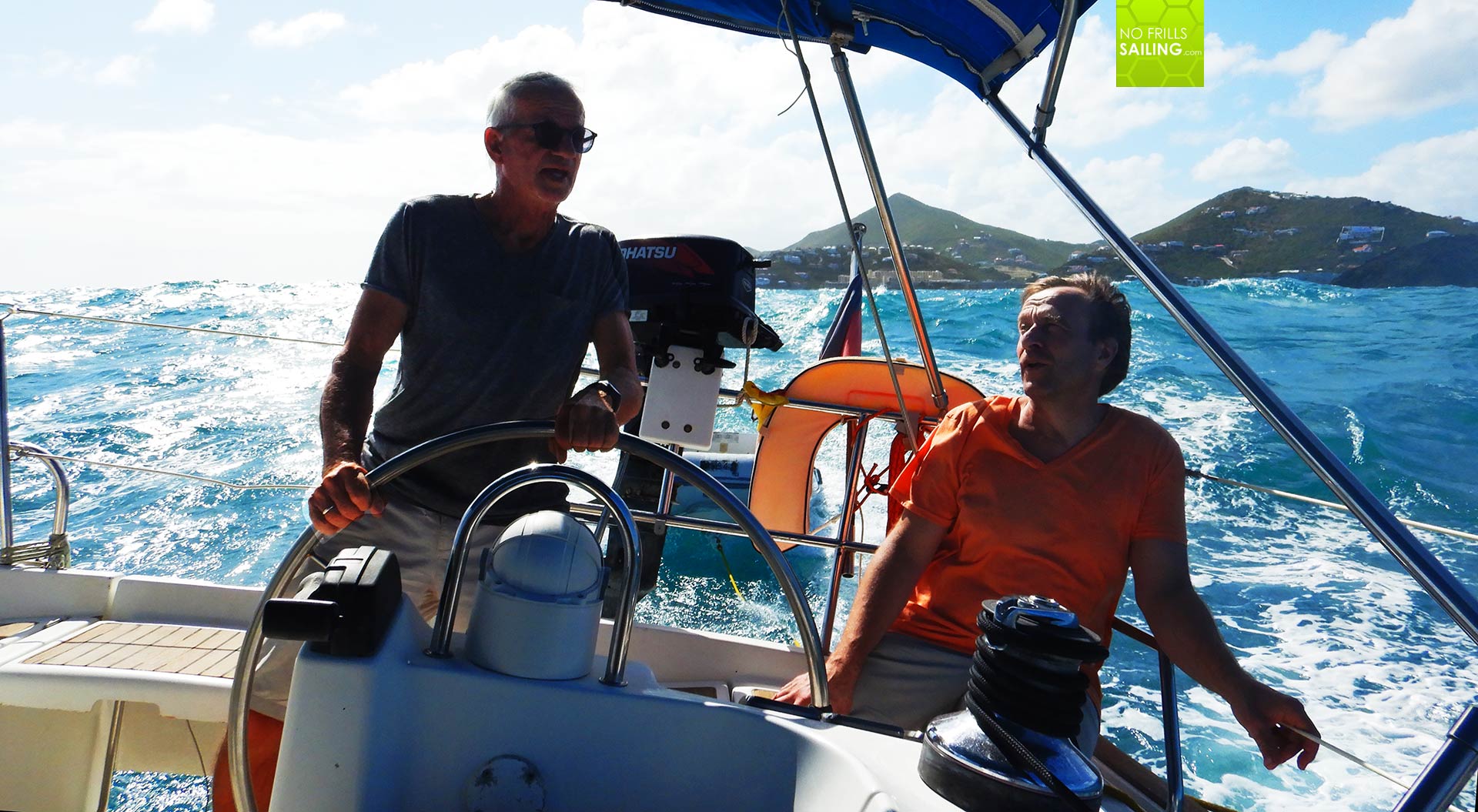
NO FRILLS SAILING.com: “Let´s talk safety. One reads a lot and especially some of my American friends have warned me about a – let´s call it – fragile safety situation in the Caribbean. What´s your take on this topic?”
Joachim Fritz: (chuckles) “Really? Well, that´s amusing and corresponds with my impression of our American friends. They tend to be very, very sensitive. But I can tell you this one thing: I´d prefer the Caribbean anytime over the USA when it comes to crime and safety. No, really. I find it nonsense to unilaterally demonize the Caribbean for crime and safety-issues. Of course, there is crime, and we have heavy crime here as well – but isn´t that the case everywhere? I wouldn´t say that crime is disproportionately higher than anywhere else. There are spots where you shouldn´t go and show yourself as a “rich European” or “rich traveler”, of course, but that´s valid in Hamburg as well as in New York or anywhere else.”
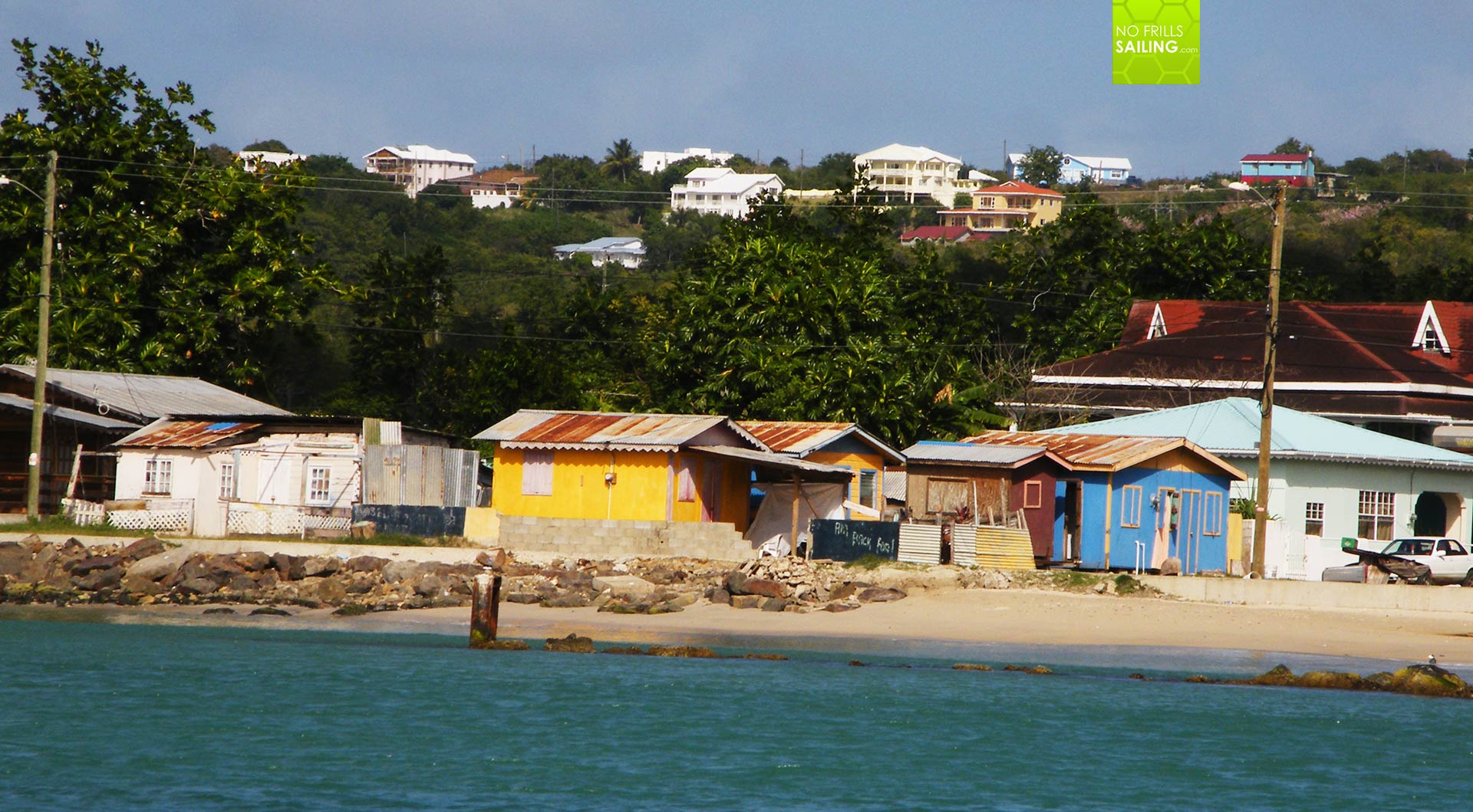
NO FRILLS SAILING.com: “But there are always reports of assaults on yachts and mugging and stuff …”
Joachim Fritz: “Yes, that happens, occasionally, that is true. But these are really rare occasions – but the press inflates them to draw a rather dark picture. The truth is, when you arrive as a skipper somewhere, you ask other cruisers around or talk to the locals: Where to clear inward, customs, where to get food and sort of things. Normally you ask if this or that place is okay. If you happen to choose an unsafe area, they will tell you and you will react. Especially in the southern Windwards we have the “Boat Boys” offering their services like picking up a mooring sometimes in a fairly intensive manner. A friendly “thanks for your help” and a little Dollar contribution will make them happy. Local governments are working on a control system. I have never had serious problems in 25 years, believe me! Here on Saint Martin, for example, a gang now is stealing Dinghies. So we all get steel chains and proper safeguards to secure the little boats. The gang will be caught soon, I am pretty sure. You see, there´s a lot of gossip and greed. The loss of one island is the gain of another… But in general, the people here are so friendly. I´ve never met friendlier and more open-minded people than those of the West-Indies. It is like with everything in life: What goes around, comes around. I tend to meet people with friendliness and without prejudice. Smile is a currency. Of course, there is also the other side of the relaxed Caribbean lifestyle. Never rely on promises that your project will be handled in time for the price you agreed on and the quality you expected. But German efficiency, I must say, would definitely kill the charm of the islands. In these regards, especially in St. Martin, things have lately changed by the Megayacht business and you will find here highly skilled craftsmen and accordingly very high costs.”
Corona trouble and pandemic aftermath
NO FRILLS SAILING.com: “Corona pandemic and restrictions are a topic since 2 years now. Even with Omicron variant undeniably immunizing the people with – lucky for us all! – mild symptoms, I am sure Covid will play a role for years to come. What about handling of this issue in the Caribbean?”
Joachim Fritz: “Well, it was and kind of still is an absolute catastrophy! I have to say that this hard. It´s very chaotic and nobody really knows which rules do apply and when and how. During lockdown there was a great panic amongst the people. I remember at one point even swimming in the Ocean alone was forbidden. Slowly people adapted and rules have been applied. Nevertheless, you are right, the rules are different from island to island. It´s insane! And rules change all the time, over night. So, if you come here, you should inform yourself very thoroughly which rules apply, where and how to arrive, how to clear customs and such. The cost for doing so is also very high and that´s a scandal I´d say. Some islands let you pass and welcome you, just to “offer” a mandatory PCR-test for 250 Dollars. I´ve heard of crews put into 10 day quarantine on Saint Vincent in a shabby hotel – overpriced room rates to be paid by the crew. This is still a real problem here and it makes me angry. Well, you see, most people here live out of tourism. There is much less tourism now so that they have to look for other income – ripping off sailors may be one it seems. On the other way, you kind of adapt: Martinique, Guadeloupe and Saint Martin are relatively easy and free to roam, but as I said, there´s a real chance you get put to quarantine.”
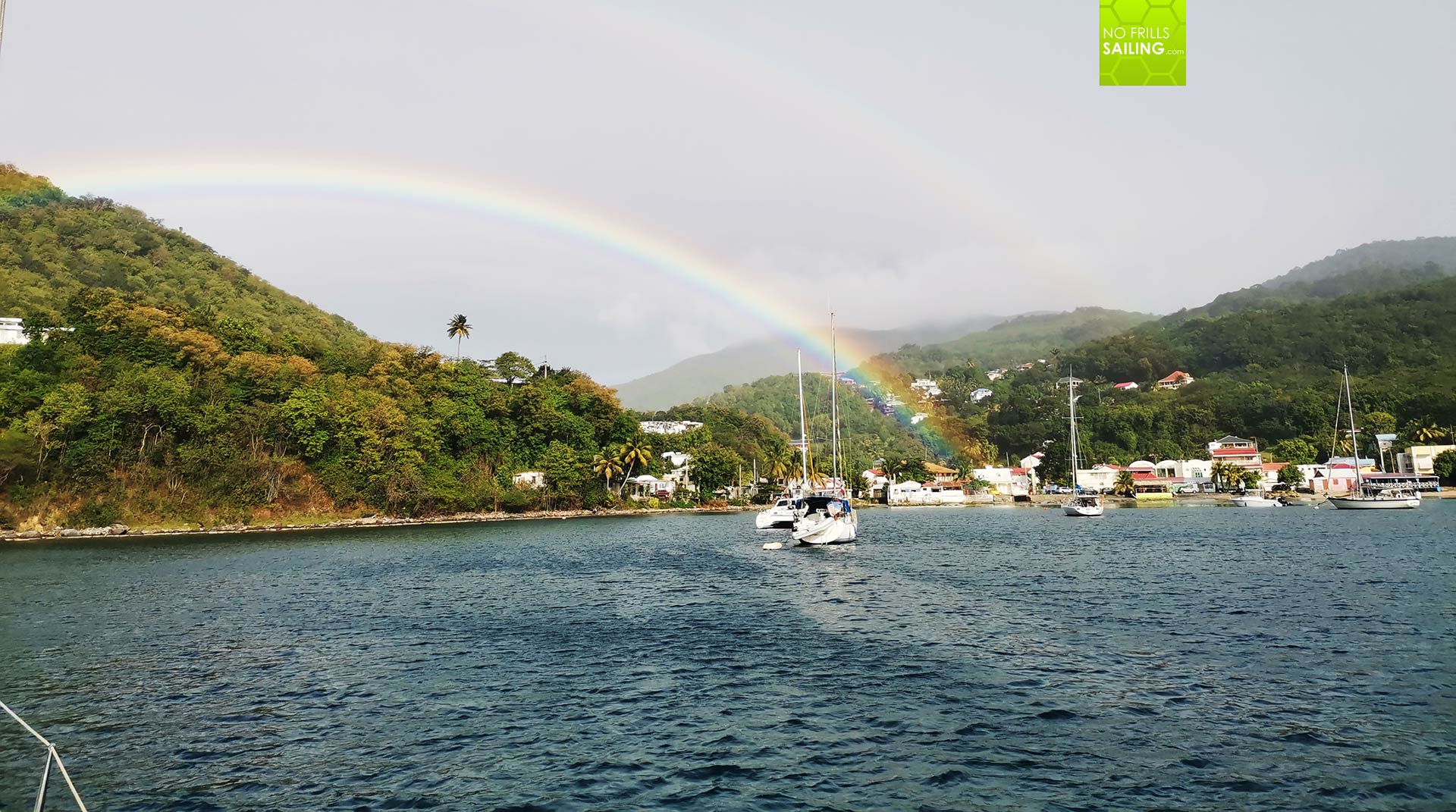
NO FRILLS SAILING.com: “But things level out now, don´t you think?”
Joachim Fritz: “Yes, that´s the hope at least. You see, it´s different here because people are different. I would say that most islanders are very skeptical about vaccination. I don´t know where this comes from, but we have very low vaccination rates here, hovering just under 40% who received at least one jab. Maybe it´s some Voodoo-belief, maybe a “proper” skepticism against state-enacted measures. There´s also a lot gossip going on, many have fears to get sterile or something. But anyways, if you want to get your shot, you can get it, for sure.”
About Hurricanes and global climate change
NO FRILLS SAILING.com: “Storing my boat over Hurricane season is a huge thing for my own project. What is your take on securing the boats against tropical storm systems and your opinion on this?”
Joachim Fritz: “Lars, up until now I have lived through sixteen Hurricanes. Out of these, we have been hit directly three times by mayor ones. As I said earlier, our dear DAPHNE had been destroyed by Luis in 1995 and Irma 2017, the latest storm destroyed one of my boats and damaged the other one. Irma, by the way, was my worst ever Hurricane experience. Most people just cannot comprehend what is going on in a Hurricane. You simply have no idea of the sheer force that is upon you: Can you imagine what a steady 350 kilometers per hour-wind does to a house? It´s a brutal, horrific elemental force and there is nothing romantic or exciting about it! It’s a catastrophe hitting. When it comes to boats, I tell you: It is always you, doing everything you can to secure your boat. And it is mostly an other boat of a lazyman destroying yours.”

NO FRILLS SAILING.com: “That sounds a bit futile …”
Joachim Fritz: “It kind of is, yes. Because frankly, I´ve seen catamarans tossed around by the wind, flipping over like paper. Can you imagine? There is nothing to do. Most people stay much South over the season, “under” the Hurricane lane. If you cannot, like you, always put the boat on the hard. Don´t leave it in the water. Also, take down the mast. Look for good yards, look for hardened underground and see that the boat is strapped down as tightly as you can. I don´t fancy pits. Many yards offer pits into which ley lower the hulls. That may sound clever, but a Hurricane often comes with a significant rise in sea level – then your boat will float or drown. I´ve seen wing keels ripped off too. So, ask around, to look for a bargain. But in any case – there is no guarantee. And that means: Have a proper insurance that covers Hurricane damage or loss. That´s the only way.”
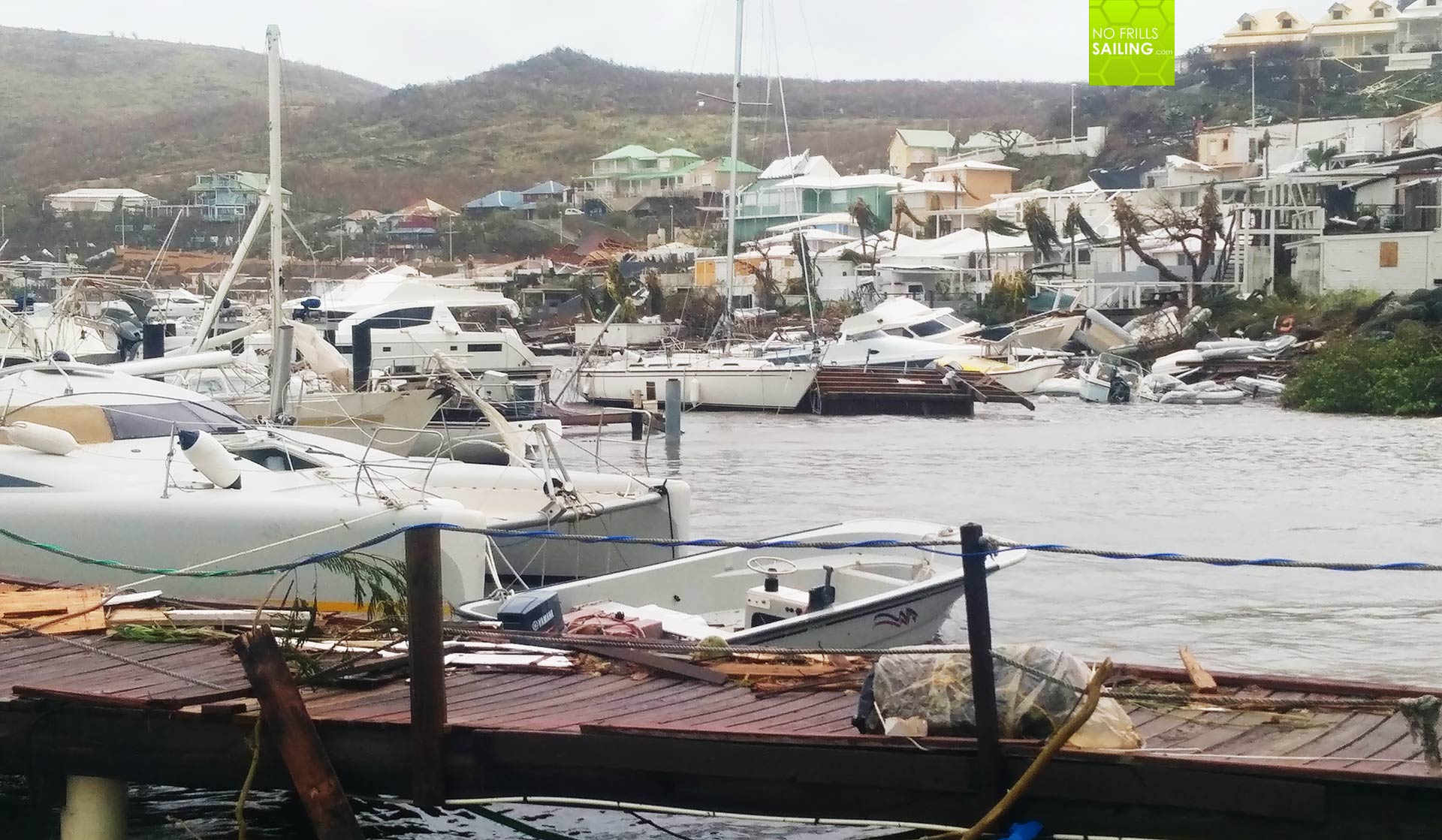
NO FRILLS SAILING.com: “Is severe weather worsening over time? I mean, you live there for almost four decades now.”
Joachim Fritz: “Definitely! I mean, many deny it and – also here – do simply not acknowledge the signs. But you can see it everywhere: Sea level is rising. The water gets hotter by the year, nowadays water temperatures of 28, 29 degrees Celsius are normal, can you imagine? We receive more and more extreme weather. That´s more Killer-Hurricanes for sure. Worst thing is, as weather forecast is grounded on data collected for the past 50 or 60 years, these models simply do not apply anymore – so we see that weather systems tend to behave differently, prediction of paths turn our wrong and as such forecast is not so reliable anymore. You simply cannot trust it 100 percent. That´s a big problem! My personal opinion is that the season kind of shifted toward later in the year, kind of starting now in February, not in November – when it comes to Atlantic crossing.”
First time sailing to the Caribbean
NO FRILLS SAILING.com: “What would you tell a first-timer, like me, planning to cross the Atlantic Ocean to the Caribbean?”
Joachim Fritz: “Sailing the Atlantic is pretty straightforward and technically I would say you don´t need advice. But. But every newcomer I would strongly advise to simply turn off any thoughts about schedules! Just simply don´t. You need to have time. That is the single most important thing! Do not try to squeeze in a tight schedule, I can tell you right away: It won´t happen. Clocks tick different here, weather is a big factor. You say one week? I say one month! No pressure, no buy plane tickets, don´t rush and be pushed to make decisions to fit a schedule which force you to take more risk or make mistakes. Always and everything – it takes longer here. And my second advise is as following: If you have a budgetary plan – take it and duplicate. Just consider that you will surely need twice the amount.”
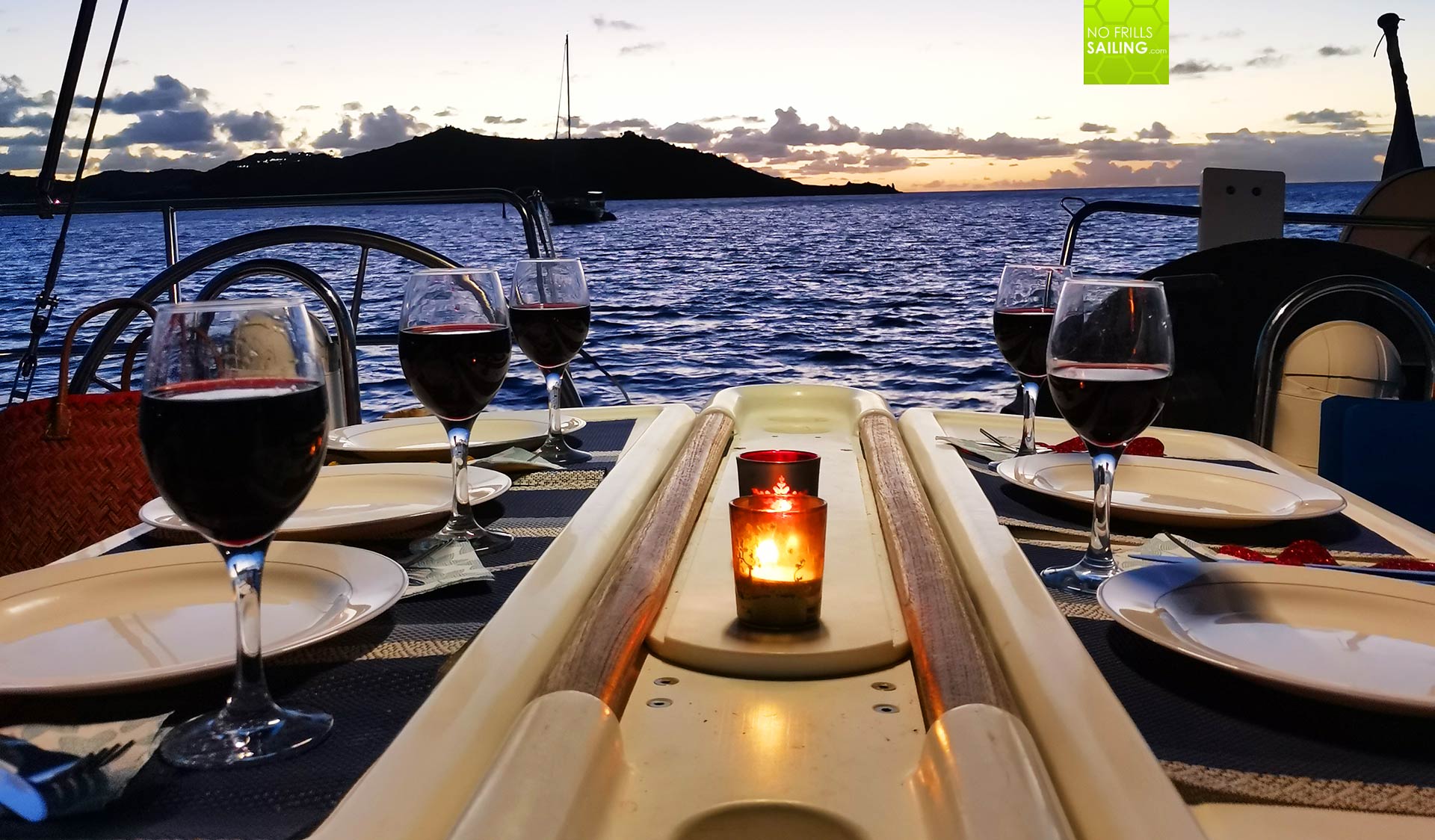
NO FRILLS SAILING.com: “So, at last, Joachim – what do you think about my plan to sail over to the Caribbean in mid-December and what´s your opinion?”
Joachim Fritz: “Well, you know, from my point of view there could be a better time to cross from January on. I know, I know, most of the people – many of them driven by the ARC – do it much earlier. That is to have Christmas Eve or at least New Year´s Eve in the Islands, which I can understand. But we have talked about the change of weather pattern. I find it much safer to cross over later, you will find steady Trade Winds and have a much more relaxed passage.”
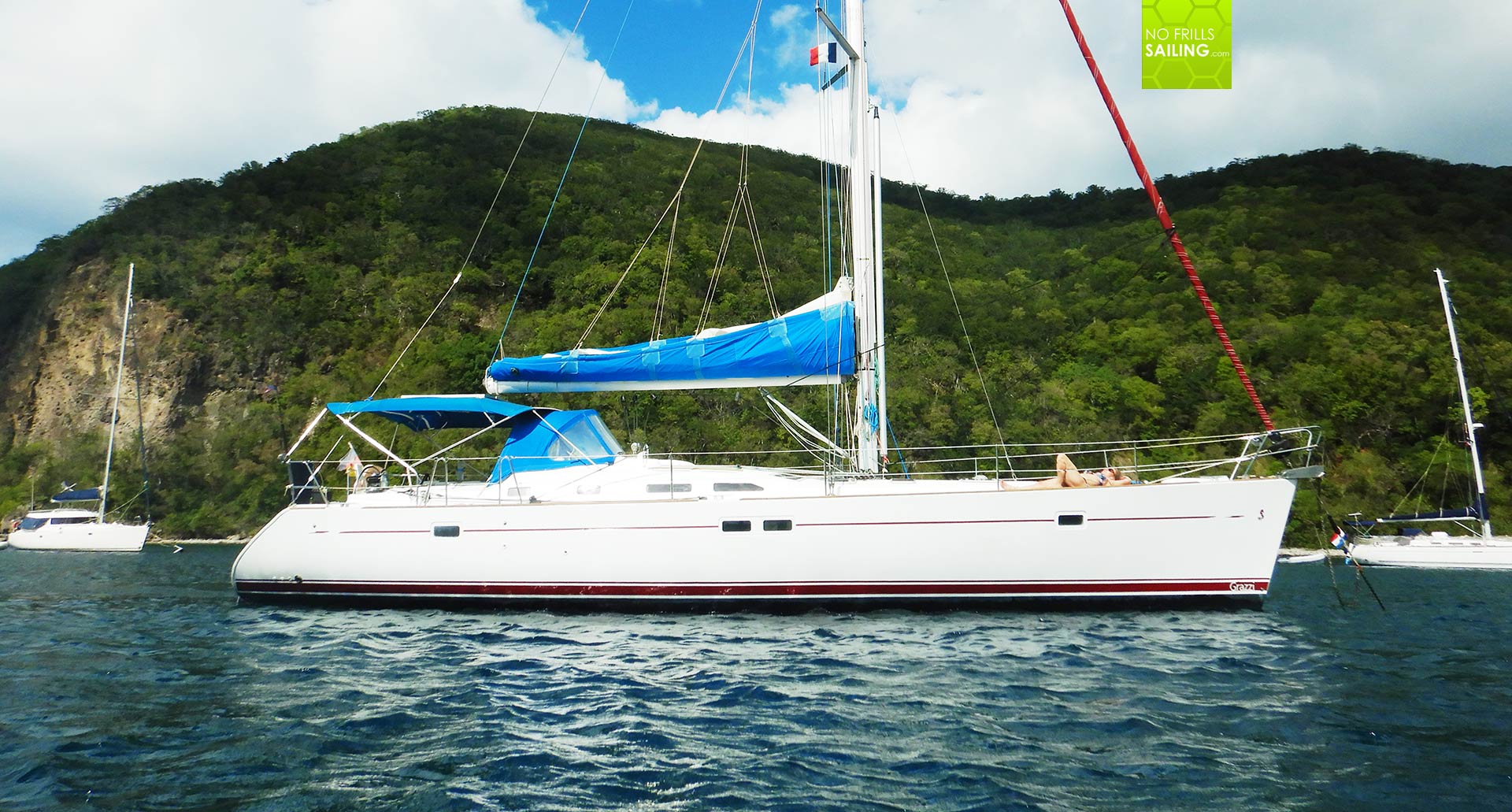
NO FRILLS SAILING.com: “That is a new one to me …”
Joachim Fritz: “Well, yes. I am sure that this will find its way to the general communication sooner or later. I often hear from passage crews that they got into sever weather starting at the Canary Islands at the classic time. A year ago I had a boat delivered from Cadiz and I got stuck in the Canary Islands because of an approaching tropical system. I could just barely avoid a divorce from my wife by arriving in St. Martin on December 23rd. But it´s a change globally and this will also change seafaring, I am sure. For us down here I guess it could be kind of positive, because when weather shifts more North, we could get out of that for St. Martin typical Hurricane path – vice versa, countries like England or France must brace themselves to get hit more and more severe by Hurricanes. At least this is my humble opinion and based on 40 years of experience. I quit official work but I go on to offer my experience as a skipper – very soon my web side will be ready and people can book courses aboard my boat and train them on Caribbean sailing skills. Maybe we can meet in person, when you arrive here and I am happy to share more.”
Joachim, thanks so much for your time and patience! This was such an enlightening conversation that really taught me a lot. Thank you and – of course! – if I happen to arrive to Saint Martin one day, I will for sure knock on the deck of your Oceanis!
All pictures (c) Joachim Fritz – with kind permission
You may also be interested to reading these related articles:
Sailing alone across the Atlantic on a small boat, part 1 and 2
Lanzarote via Selvagem Islands – offshore time!
